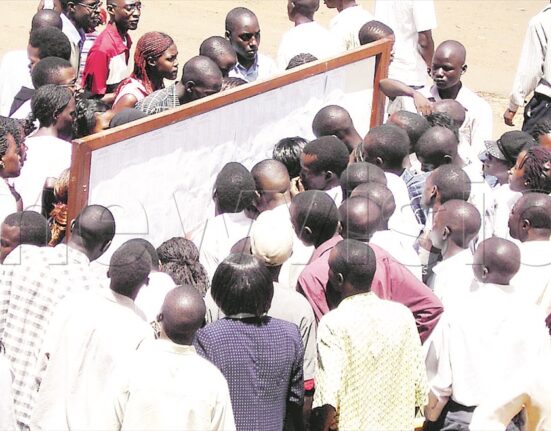By Martin Kitubi
Although the Education Act, 2008 empowers the education minister to regulate fees, a section of school owners has asked the Government to halt the passing and implementation of the proposed statutory instrument on school fees.
Under the draft Statutory Instrument on School Fees, the education ministry proposes a cap on school charges and it is expected to be rolled out starting next term.
Some parents told New Vision last week that the move to cap school fees was long overdue.
Lamentations
“We have lamented about school fees for a long time and no one could come to our rescue. On top of the fees, these schools also ask us to buy cement, pay development fee and other requirements that are not necessarily of direct help to the children at school. It is like an extortion syndicate of sorts. When you complain, they tell you to take your child to government schools,” Tom Ssenabulya, a parent of four, said.
However, school owners under the National Private Education Institutions Association (NPEIA-Uganda), yesterday asked the education ministry to first conduct a study on the unit cost of educating a child per school before setting the fees.
The unit cost study, according to the proprietors, should consider the meals offered to learners, the facilities as well as the number of staff employed per school.
According to the school owners, this will inform the Government on the best way to set a fees cap other than lumping together different schools offering different services.
If school fees are controlled by the Government through a uniform ceiling, the proprietors say, it will impact the quality of education offered by some schools.
Although the government-aided schools receive grants, income tax waivers and scholastic materials from the Government, NPEIA members indicated that these are charging much more compared to private ones which rely on fees for both development and operation funds.
“The private schools and government-aided schools cannot have a uniform regulation. Whereas these (government-aided) are highly subsidised by the Government through paying staff salaries, having income tax waivers, helping in infrastructural development as well as providing textbooks, private ones receive nothing.
“The majority of the government aided schools charge extremely higher than private schools. Therefore, regulating private schools on school fees is completely an injustice to school owners,” the school proprietors said in a joint statement.
Root Cause
According to NPEIA, the main cause of school fees increments are factors of production and education inputs such as price for utilities and food supplies.
They argued that regulating fees without addressing the cost of doing business, will frustrate schools.
The proprietors also indicated that as entrepreneurs who invest a lot of funds, they expect returns on their investment. Controlling fees, they said, would deny them a return on investment.
Hasadu Kirabira, the NPEIA national chairman, explained that schools charge fees depending on the prevailing costs of doing business.
“We have all seen what happened last year; the fuel prices went from sh3,600 before COVID-19 to sh7,000 and more. This drove the prices high and yet we had to open schools.
“We could not operate under the same fees structure of 2019. Therefore, the Government cannot regulate fees when the cost of supplies is not regulated,” he said.
He made the remarks in an interview with New Vision shortly after addressing journalists at the NPEIA Headquarters in Namuwongo, a Kampala city suburb.
Proposed Fees Cap
According to the draft statutory instrument on school fees, the education ministry proposed a ceiling on school fees for pre-primary, primary, secondary and vocational institutions.
The draft instrument proposes that pre-primary (nursery) schools shall not charge more than sh690,000 in both school fees and charges combined per term.
In addition, a day-primary school will not charge more than sh650,000 in both fees and other charges, whereas a boarding primary school will not charge more than sh1.2m a term.
At secondary school level, day students will only pay sh960,000 whereas those in the boarding section will not pay more than sh1.6m in fees and charges a term.
According to the statutory instrument, all secondary school students, whether in O’ or A’level, will pay uniform fees. Students enrolled under vocational institutions, will not pay more than sh960,000 in fees and charges for day scholars and sh1.6m for those enrolled in the boarding sections.
For the government-aided schools that receive tuition, a pupil or student shall not be required to pay fees.
According to the instrument, where allowable requirements are charged on fees, a pupil or student shall not be required to make any additional monetary contributions.
In addition, a pupil or a student in government-founded schools shall not be required to pay tuition fees.
However, the statutory instrument says the government-founded schools may charge fees for allowable requirements.
Penalties
According to the proposed instrument, a school owner shall not levy school charges or fees exceeding the amounts prescribed in the regulations.
The school owner as described by the statutory instrument, includes the founding body of a school and a person that is wholly or partially responsible for the ongoing activities of the school.
According to the proposed statutory instrument, there shall be school charges and fees regulatory committee.
The committee will be constituted by the education minister and the education ministry’s permanent secretary will be its chairperson. It will also include the commissioners for basic education, technical vocational education and training (TVET), education policy and research, government secondary schools, private schools and institutions, education planning as well as the head of audit in the education ministry.
The committee shall review and approve the school charges and fees structure in accordance with the approved regulations at least every after two years.
However, they will also be required to follow the criteria proposed by the ministry to review the fees.
“A school owner who levies school charges and fees in excess of the amounts prescribed in schedule 2 to these regulations, commits an offence and is liable, on conviction, to a fine not exceeding fifty currency points (sh1m) or a term of imprisonment not exceeding twelve months or both,” the ministry.
What Others Say
Dr Stephen Waako Muzinge, the proprietor of Kaliro College School, noted that some parents suggest the kind of services that schools should offer to their children.
This too, he said, has a huge implication on schools because schools have to charge more to render these services.
The school proprietors also challenged the ministry for inviting them at the 11th hour to discuss a fees policy that requires more consultations.
“The ministry has been developing this statutory instrument on fees for some time, but they only invited us to make comments at the 11th hour. That is not right,” Bartholomew Muramuzi, the deputy chairperson of NPEIA, said.
Ministry’s Explanation
The education ministry has, however, asked the public to remain calm. In an interview with New Vision, Ketty Lamaro, the education ministry permanent secretary, said the ministry was still consulting stakeholders over the subject matter.
“The education ministry is still consulting and will communicate to the public at the right time. Yes, consultations are intended to come up with a decision that will be fair to all stakeholders,” Lamaro said.









Leave feedback about this